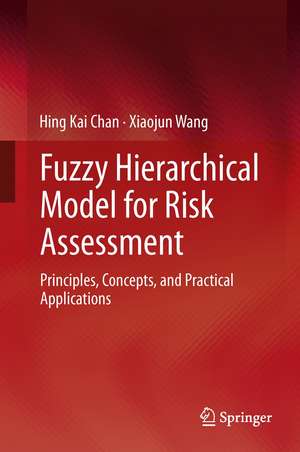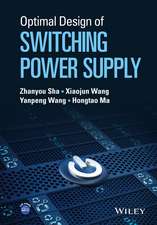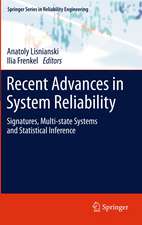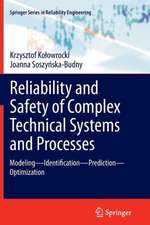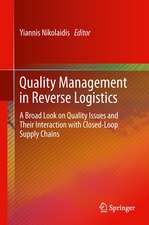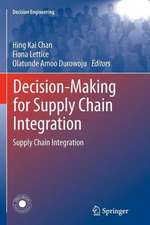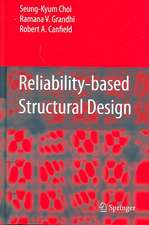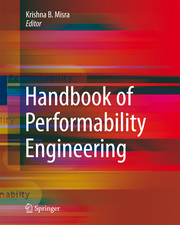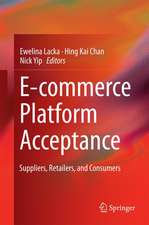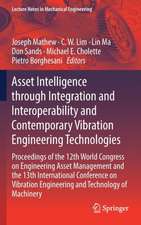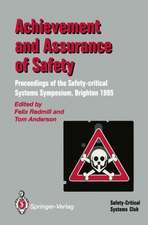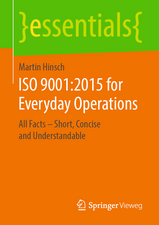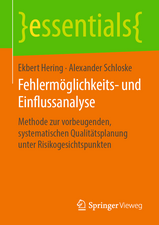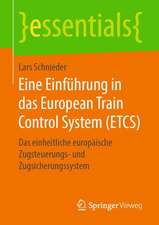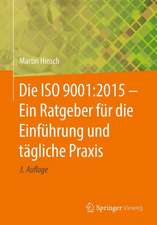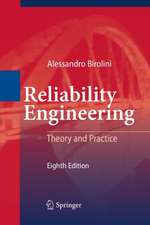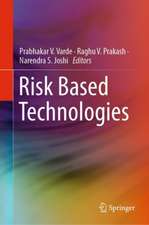Fuzzy Hierarchical Model for Risk Assessment: Principles, Concepts, and Practical Applications
Autor Hing Kai Chan, Xiaojun Wangen Limba Engleză Hardback – 24 apr 2013
This approach is illustrated through number of case studies using examples from the food, fashion and electronics sectors to cover a range of applications including supply chain management, green product design and green initiatives. These practical examples explore how this method can be adapted and fine tuned to fit other industries as well.
Supported by an extensive literature review, Fuzzy Hierarchical Model for Risk Assessment comprehensively introduces a new method for project managers across all industries as well as researchers in risk management.
this area.
| Toate formatele și edițiile | Preț | Express |
|---|---|---|
| Paperback (1) | 634.68 lei 6-8 săpt. | |
| SPRINGER LONDON – 22 mai 2015 | 634.68 lei 6-8 săpt. | |
| Hardback (1) | 640.88 lei 6-8 săpt. | |
| SPRINGER LONDON – 24 apr 2013 | 640.88 lei 6-8 săpt. |
Preț: 640.88 lei
Preț vechi: 753.97 lei
-15% Nou
Puncte Express: 961
Preț estimativ în valută:
122.67€ • 133.29$ • 103.11£
122.67€ • 133.29$ • 103.11£
Carte tipărită la comandă
Livrare economică 21 aprilie-05 mai
Preluare comenzi: 021 569.72.76
Specificații
ISBN-13: 9781447150428
ISBN-10: 1447150422
Pagini: 173
Ilustrații: VII, 169 p.
Dimensiuni: 155 x 235 x 17 mm
Greutate: 0.43 kg
Ediția:2013
Editura: SPRINGER LONDON
Colecția Springer
Locul publicării:London, United Kingdom
ISBN-10: 1447150422
Pagini: 173
Ilustrații: VII, 169 p.
Dimensiuni: 155 x 235 x 17 mm
Greutate: 0.43 kg
Ediția:2013
Editura: SPRINGER LONDON
Colecția Springer
Locul publicării:London, United Kingdom
Public țintă
ResearchCuprins
Hierarchical Model in Decision-Making.- Multi-criteria Decision-Making for Risk Assessment.- Fuzzy Hierarchical Model for Risk Assessment.- Mathematical Formulation.- Application in Product Design.- Application in Fashion Supply Chain.- Application in Food Supply Chain.- Extension of the Hierarchical Model.
Notă biografică
Dr. Hing Kai Chan joined the Norwich Business School of the University of East Anglia in September 2007 and is now a Senior Lecture in Operations and Supply Chain Management. He has been conducting research with the applications of soft computing like fuzzy logic for several years. He has extended his research to cover supply chain management in recently years for his PhD study by employing multi-agent approaches for analyzing the performance of distributed supply chains. In recent years, Dr. Chan started employing genetic algorithms for solving scheduling problems. He has studied some production and distribution models, which are structured in two-level and three-level multi-factory production environment, operating in mass production. In short, Dr. Chan has expertise on the formulation of optimization models and heuristic solution approaches, such as linear programming, integer programming in various decision support systems. To date, he has published over 60 refereed international journal papers, including leading journals like various IEEE Transactions, International Journal of Production Economics, International Journal of Production Research, Decision Support Systems, Expert System with Applications. He also published more than 30 refereed conference papers.
Dr. Xiaojun Wang joined the School of Economics, Finance and Management of the University of Bristol as a lecturer in management in September 2011. Before that, he worked at Norwich Business School of the University of East Anglia as the lecturer in supply chain management for two years. He obtained his PhD from the University of Liverpool, where he developed an approach to improve food supply chain performance through integration of traceability system with operations management decisions. In recent years,Xiaojun’s main research focuses on provision of new business models to support decision making process through the analytical modeling approach. For example, he has been conducting research on risk assessment models using fuzzy set theory and multi-criteria decision making approaches such as analytical hierarchy process and analytical network process. The research has been applied in many industry sectors and published in leading international journals such as International Journal of Production Economics, International Journal of Production Research and Production Planning and Control.
Dr. Xiaojun Wang joined the School of Economics, Finance and Management of the University of Bristol as a lecturer in management in September 2011. Before that, he worked at Norwich Business School of the University of East Anglia as the lecturer in supply chain management for two years. He obtained his PhD from the University of Liverpool, where he developed an approach to improve food supply chain performance through integration of traceability system with operations management decisions. In recent years,Xiaojun’s main research focuses on provision of new business models to support decision making process through the analytical modeling approach. For example, he has been conducting research on risk assessment models using fuzzy set theory and multi-criteria decision making approaches such as analytical hierarchy process and analytical network process. The research has been applied in many industry sectors and published in leading international journals such as International Journal of Production Economics, International Journal of Production Research and Production Planning and Control.
Textul de pe ultima copertă
Risk management is often complicated by situational uncertainties and the subjective preferences of decision makers. Fuzzy Hierarchical Model for Risk Assessment introduces a fuzzy-based hierarchical approach to solve risk management problems considering both qualitative and quantitative criteria to tackle imprecise information.
This approach is illustrated through number of case studies using examples from the food, fashion and electronics sectors to cover a range of applications including supply chain management, green product design and green initiatives. These practical examples explore how this method can be adapted and fine tuned to fit other industries as well.
Supported by an extensive literature review, Fuzzy Hierarchical Model for Risk Assessment comprehensively introduces a new method for project managers across all industries as well as researchers in risk management.
This approach is illustrated through number of case studies using examples from the food, fashion and electronics sectors to cover a range of applications including supply chain management, green product design and green initiatives. These practical examples explore how this method can be adapted and fine tuned to fit other industries as well.
Supported by an extensive literature review, Fuzzy Hierarchical Model for Risk Assessment comprehensively introduces a new method for project managers across all industries as well as researchers in risk management.
Caracteristici
Proposes a hierarchical approach to multi-criteria risk assessment incorporating fuzzy logic to balance qualitative and quantitative elements so that a final risk index can be calculated Applies methods to a variety of cases, namely, green initiatives in the fashion industry, eco-design of electrical products, and food supply chains to illustrate how the proposed model can be employed in real-life applications Includes an extensive literature review on the topic
